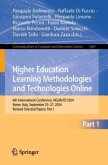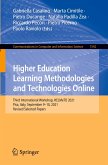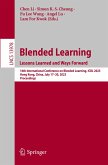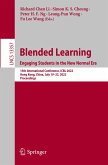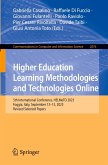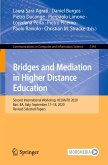Higher Education Learning Methodologies and Technologies Online
6th International Conference, HELMeTO 2024, Rome, Italy, September 25-27, 2024, Revised Selected Papers, Part II
Herausgegeben:Ardimento, Pasquale; Di Fuccio, Raffaele; Fulantelli, Giovanni; Limone, Pierpaolo; Pecori, Riccardo; Raviolo, Paolo; Rondonotti, Marco; Schicchi, Daniele; Taibi, Davide; Zaza, Gianluca
Higher Education Learning Methodologies and Technologies Online
6th International Conference, HELMeTO 2024, Rome, Italy, September 25-27, 2024, Revised Selected Papers, Part II
Herausgegeben:Ardimento, Pasquale; Di Fuccio, Raffaele; Fulantelli, Giovanni; Limone, Pierpaolo; Pecori, Riccardo; Raviolo, Paolo; Rondonotti, Marco; Schicchi, Daniele; Taibi, Davide; Zaza, Gianluca
- Broschiertes Buch
- Merkliste
- Auf die Merkliste
- Bewerten Bewerten
- Teilen
- Produkt teilen
- Produkterinnerung
- Produkterinnerung
The two-volume set CCIS 2467 and 2468 constitutes the refereed post-conference proceedings of the 6th International Conference on Higher Education Learning Methodologies and Technologies Online, HELMeTO 2024, held in Rome, Italy, during September 25 27, 2024.
The 46 revised full papers presented in these proceedings were carefully reviewed and selected from 101 submissions. The papers are organized in the following topical sections:
Part I: Artificial Intelligence in Education Emerging Technologies and Digital Transformation in Education. Part II: Inclusion, Well-being, and Student…mehr
Andere Kunden interessierten sich auch für
![Higher Education Learning Methodologies and Technologies Online Higher Education Learning Methodologies and Technologies Online]() Higher Education Learning Methodologies and Technologies Online98,99 €
Higher Education Learning Methodologies and Technologies Online98,99 €![Higher Education Learning Methodologies and Technologies Online Higher Education Learning Methodologies and Technologies Online]() Higher Education Learning Methodologies and Technologies Online85,59 €
Higher Education Learning Methodologies and Technologies Online85,59 €![Blended Learning : Lessons Learned and Ways Forward Blended Learning : Lessons Learned and Ways Forward]() Blended Learning : Lessons Learned and Ways Forward53,99 €
Blended Learning : Lessons Learned and Ways Forward53,99 €![Blended Learning: Engaging Students in the New Normal Era Blended Learning: Engaging Students in the New Normal Era]() Blended Learning: Engaging Students in the New Normal Era80,24 €
Blended Learning: Engaging Students in the New Normal Era80,24 €![Higher Education Learning Methodologies and Technologies Online Higher Education Learning Methodologies and Technologies Online]() Higher Education Learning Methodologies and Technologies Online85,99 €
Higher Education Learning Methodologies and Technologies Online85,99 €![Bridges and Mediation in Higher Distance Education Bridges and Mediation in Higher Distance Education]() Bridges and Mediation in Higher Distance Education38,99 €
Bridges and Mediation in Higher Distance Education38,99 €![Technology and Innovation in Learning, Teaching and Education Technology and Innovation in Learning, Teaching and Education]() Technology and Innovation in Learning, Teaching and Education57,99 €
Technology and Innovation in Learning, Teaching and Education57,99 €-
-
-
The two-volume set CCIS 2467 and 2468 constitutes the refereed post-conference proceedings of the 6th International Conference on Higher Education Learning Methodologies and Technologies Online, HELMeTO 2024, held in Rome, Italy, during September 25 27, 2024.
The 46 revised full papers presented in these proceedings were carefully reviewed and selected from 101 submissions. The papers are organized in the following topical sections:
Part I: Artificial Intelligence in Education Emerging Technologies and Digital Transformation in Education.
Part II: Inclusion, Well-being, and Student Support Educational Policy, Ethics, and Teacher Professional Development.
The 46 revised full papers presented in these proceedings were carefully reviewed and selected from 101 submissions. The papers are organized in the following topical sections:
Part I: Artificial Intelligence in Education Emerging Technologies and Digital Transformation in Education.
Part II: Inclusion, Well-being, and Student Support Educational Policy, Ethics, and Teacher Professional Development.
Produktdetails
- Produktdetails
- Communications in Computer and Information Science 2468
- Verlag: Springer / Springer Nature Switzerland / Springer, Berlin
- Artikelnr. des Verlages: 978-3-031-93998-3
- Seitenzahl: 348
- Erscheinungstermin: 8. August 2025
- Englisch
- Abmessung: 235mm x 155mm x 19mm
- Gewicht: 529g
- ISBN-13: 9783031939983
- ISBN-10: 3031939980
- Artikelnr.: 73949811
- Herstellerkennzeichnung
- Springer-Verlag GmbH
- Tiergartenstr. 17
- 69121 Heidelberg
- ProductSafety@springernature.com
- Communications in Computer and Information Science 2468
- Verlag: Springer / Springer Nature Switzerland / Springer, Berlin
- Artikelnr. des Verlages: 978-3-031-93998-3
- Seitenzahl: 348
- Erscheinungstermin: 8. August 2025
- Englisch
- Abmessung: 235mm x 155mm x 19mm
- Gewicht: 529g
- ISBN-13: 9783031939983
- ISBN-10: 3031939980
- Artikelnr.: 73949811
- Herstellerkennzeichnung
- Springer-Verlag GmbH
- Tiergartenstr. 17
- 69121 Heidelberg
- ProductSafety@springernature.com
.- Inclusion, Well-being, and Student Support.
.- Artificial Intelligence in Special Education: Enhancing IEP Design with CONALI & ChatGPT.
.- AI-personalized Mindfulness sessions to promote the emotional well-being in higher education.
.- University students with Special Educational Needs: An assessment of satisfaction and perceptions of e-learning and services provided.
.- Play at first sight: A literature review on the integration of Eye-tracking into special needs education.
.- Innovative Approaches in Teacher Education: Active Breaks and Technology Integration.
.- Development and initial validation of a future teacher anxiety questionnaire: a pilot study.
.- Stress in the university population: a literature review of the positive role of physical activity to improve the well being of students.
.- Pre-service Teachers and Public Speaking Anxiety. Insights and possible interventions through AI and IoT.
.- Enhancing social presence through art: a study on the intersection of emotions and class engagement.
.- Enhancing educational inclusion through advanced Assistive Technologies: impact of AR, VR and AI integration in supporting students with motor and communication impairments.
.- Educational Policy, Ethics, and Teacher Professional Development.
.- The Role of Universities in Teachers' Professional Development: a Model Proposal.
.- AI Act: a quanti-qualitative analysis.
.- Business Schools practices: a websites content analysis.
.- Faculty Development for the integration of a comprehensive perspective on AI in Higher Education: LookAIHed, a case study.
.- Brain dominance and neuromyths: widespread beliefs among Italian teachers.
.- Sensor-Based to Interaction-Based AI Models in Education: The JOINclusion Case Study.
.- Digital Innovation and Internationalisation through eTwinning: Reimagining Initial Teacher Education.
.- Developing Assessment Competences in Teacher Education: Insights from Moodle-Based Task.
.- Transversal Competences with AI: Training Implications and Faculty Development Perspectives.
.- The influence of online education and secondary school teachers' views on digital competencies.
.- Artificial Intelligence in Special Education: Enhancing IEP Design with CONALI & ChatGPT.
.- AI-personalized Mindfulness sessions to promote the emotional well-being in higher education.
.- University students with Special Educational Needs: An assessment of satisfaction and perceptions of e-learning and services provided.
.- Play at first sight: A literature review on the integration of Eye-tracking into special needs education.
.- Innovative Approaches in Teacher Education: Active Breaks and Technology Integration.
.- Development and initial validation of a future teacher anxiety questionnaire: a pilot study.
.- Stress in the university population: a literature review of the positive role of physical activity to improve the well being of students.
.- Pre-service Teachers and Public Speaking Anxiety. Insights and possible interventions through AI and IoT.
.- Enhancing social presence through art: a study on the intersection of emotions and class engagement.
.- Enhancing educational inclusion through advanced Assistive Technologies: impact of AR, VR and AI integration in supporting students with motor and communication impairments.
.- Educational Policy, Ethics, and Teacher Professional Development.
.- The Role of Universities in Teachers' Professional Development: a Model Proposal.
.- AI Act: a quanti-qualitative analysis.
.- Business Schools practices: a websites content analysis.
.- Faculty Development for the integration of a comprehensive perspective on AI in Higher Education: LookAIHed, a case study.
.- Brain dominance and neuromyths: widespread beliefs among Italian teachers.
.- Sensor-Based to Interaction-Based AI Models in Education: The JOINclusion Case Study.
.- Digital Innovation and Internationalisation through eTwinning: Reimagining Initial Teacher Education.
.- Developing Assessment Competences in Teacher Education: Insights from Moodle-Based Task.
.- Transversal Competences with AI: Training Implications and Faculty Development Perspectives.
.- The influence of online education and secondary school teachers' views on digital competencies.
.- Inclusion, Well-being, and Student Support.
.- Artificial Intelligence in Special Education: Enhancing IEP Design with CONALI & ChatGPT.
.- AI-personalized Mindfulness sessions to promote the emotional well-being in higher education.
.- University students with Special Educational Needs: An assessment of satisfaction and perceptions of e-learning and services provided.
.- Play at first sight: A literature review on the integration of Eye-tracking into special needs education.
.- Innovative Approaches in Teacher Education: Active Breaks and Technology Integration.
.- Development and initial validation of a future teacher anxiety questionnaire: a pilot study.
.- Stress in the university population: a literature review of the positive role of physical activity to improve the well being of students.
.- Pre-service Teachers and Public Speaking Anxiety. Insights and possible interventions through AI and IoT.
.- Enhancing social presence through art: a study on the intersection of emotions and class engagement.
.- Enhancing educational inclusion through advanced Assistive Technologies: impact of AR, VR and AI integration in supporting students with motor and communication impairments.
.- Educational Policy, Ethics, and Teacher Professional Development.
.- The Role of Universities in Teachers' Professional Development: a Model Proposal.
.- AI Act: a quanti-qualitative analysis.
.- Business Schools practices: a websites content analysis.
.- Faculty Development for the integration of a comprehensive perspective on AI in Higher Education: LookAIHed, a case study.
.- Brain dominance and neuromyths: widespread beliefs among Italian teachers.
.- Sensor-Based to Interaction-Based AI Models in Education: The JOINclusion Case Study.
.- Digital Innovation and Internationalisation through eTwinning: Reimagining Initial Teacher Education.
.- Developing Assessment Competences in Teacher Education: Insights from Moodle-Based Task.
.- Transversal Competences with AI: Training Implications and Faculty Development Perspectives.
.- The influence of online education and secondary school teachers' views on digital competencies.
.- Artificial Intelligence in Special Education: Enhancing IEP Design with CONALI & ChatGPT.
.- AI-personalized Mindfulness sessions to promote the emotional well-being in higher education.
.- University students with Special Educational Needs: An assessment of satisfaction and perceptions of e-learning and services provided.
.- Play at first sight: A literature review on the integration of Eye-tracking into special needs education.
.- Innovative Approaches in Teacher Education: Active Breaks and Technology Integration.
.- Development and initial validation of a future teacher anxiety questionnaire: a pilot study.
.- Stress in the university population: a literature review of the positive role of physical activity to improve the well being of students.
.- Pre-service Teachers and Public Speaking Anxiety. Insights and possible interventions through AI and IoT.
.- Enhancing social presence through art: a study on the intersection of emotions and class engagement.
.- Enhancing educational inclusion through advanced Assistive Technologies: impact of AR, VR and AI integration in supporting students with motor and communication impairments.
.- Educational Policy, Ethics, and Teacher Professional Development.
.- The Role of Universities in Teachers' Professional Development: a Model Proposal.
.- AI Act: a quanti-qualitative analysis.
.- Business Schools practices: a websites content analysis.
.- Faculty Development for the integration of a comprehensive perspective on AI in Higher Education: LookAIHed, a case study.
.- Brain dominance and neuromyths: widespread beliefs among Italian teachers.
.- Sensor-Based to Interaction-Based AI Models in Education: The JOINclusion Case Study.
.- Digital Innovation and Internationalisation through eTwinning: Reimagining Initial Teacher Education.
.- Developing Assessment Competences in Teacher Education: Insights from Moodle-Based Task.
.- Transversal Competences with AI: Training Implications and Faculty Development Perspectives.
.- The influence of online education and secondary school teachers' views on digital competencies.


